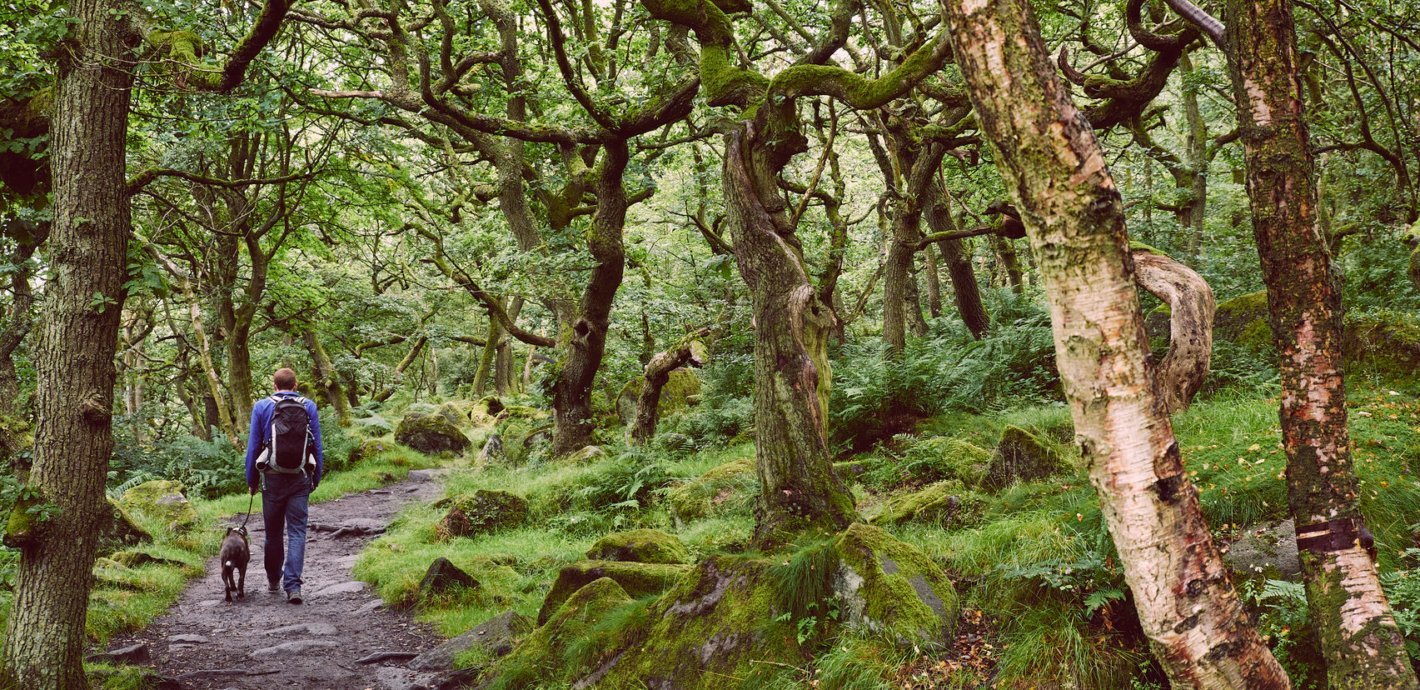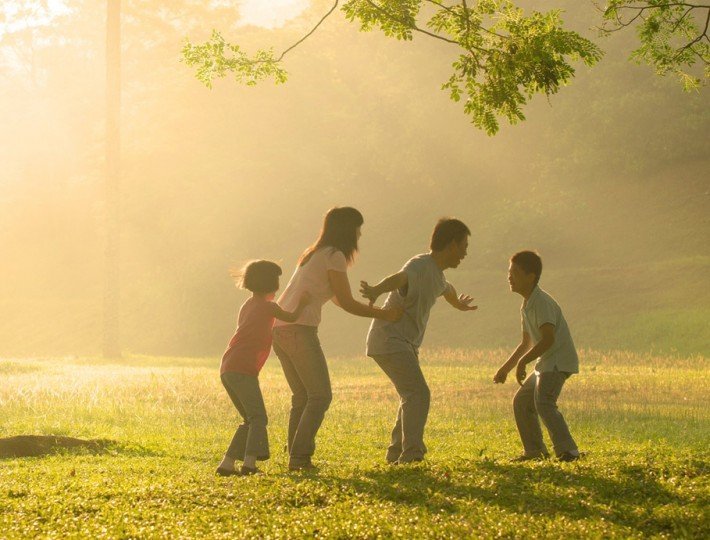Growing up, you might remember your parents hollering at you and your siblings to “Go outside and come back before dark.” You would play with the neighborhood kids, building forts, exploring, and enjoying nature until the light began to fade, signaling time for dinner.
Not anymore. A study published in Pediatrics a few years ago found that children spend less time outdoors than ever. And it’s not just kids. According to the Environmental Protection Agency, adults spend approximately 87 percent of their time in enclosed spaces or indoors. Due to lifestyle, technology, and heavily scheduled days, we’re all spending more time inside. This lack of time breathing fresh air and soaking up the sun is impacting social learning, mental health, physical health, and overall wellbeing.
In 2009, American author Richard Louv coined the phrase “Nature-Deficit Disorder” in his book Last Child in the Woods. The term summarizes the health and behavioral issues resulting from less time outdoors, and the impact this has on our mental, physical, and spiritual wellbeing. The definition is not listed as a clinical diagnosis in the Diagnostic and Statistical Manual of Mental Disorders (DSM–5), however, it is meant to encapsulate the human condition at a time when technology and being inside (at a desk or on the couch) dominate our lifestyles.
The bottom line: Nature-Deficit Disorder takes a toll on quality of life. Less movement, diminished time in the sun or fresh air, and the lack of spontaneous socializing all affect us. More than we know.
“Wonder is the source of spiritual growth. And nature is a source of wonder,” writes Louv.
Science is starting to substantiate that nature is not just a luxury, but also a significant part of the human experience. For example, being outside has proven to positively effect symptoms of ADHD, reduce stress, and improve cognition. A recent article in The New York Times noted that doctors are now prescribing time in nature. While more data is still being collected, human instinct, common sense, and an urgent need to untether from the tentacles of technology is driving us to reconnect to the earth.
“Going outside moves you to another level of consciousness—it gets you to think differently,” says postural therapist Brian Bradley. “When you leave your phone behind and get out in the wind and the trees, you actually start partaking in your environment.” And what’s more, especially for those who have struggled with mental health issues, getting in touch with nature and learning outdoor skills prove to be powerful healers. “It’s about connection—with yourself and the environment around you,” Bradley emphasizes. “Nature gets you out of your head and into your heart. And your heart is your instinct.” Wilderness and adventure therapy programs have been using the outdoors as a therapeutic tool for decades.
How Nature Influences the Brain and Body
“For more than 25 years, patients have reported feeling better in nature,” says Janet Zand, a leading practitioner of natural medicine and Sonima’s naturopathic medical advisor. Zand often prescribes time outdoors, especially for mood conditions, such as anxiety and stress—two very common concerns. She cites the findings of a recent study where two groups who walked for 90 minutes—one in a grassy, tree-filled path and the other along a heavy trafficked highway. Their brains were scanned and heart and respiration rates measured. There were significant changes in the brain. The subgenus prefrontal cortex (a brain area that is active while ruminating on redundant thoughts generally focused on negative emotions) decreased among the individuals who walked in nature versus the highway.
Nature-Deficit Disorder leaves many of us spending, not only too much time indoors, but too much time thinking. When we get out, our senses are active, we’re breathing fresh air, and able to quiet cyclical and negative thinking. Hence, why rumination was diminished in those who partook in a more scenic nature experience. Consequently, time outside allows us to literally get out of our heads.
Some organizations are recognizing the need and becoming part of the solution for Nature-Deficit Disorder. The Association of Nature and Forest Therapy, for example, has certified over 300 forest guides, including professionals from the healthcare industry. The association seeks to integrate nature and forest therapies into healthcare, education, and land management systems. According to their website: “We are connecting people with nature to benefit both.” The deeper conclusion being that awareness and immersion in the environment leads to deeper empathy, action, and symbiotic well-being.
“Ayurveda teaches that we humans are the microcosm of the macrocosm—that the natural world is reflecting the beauty and perfection of its five elements back to us and our own five elements,” says Erin Casperson, Dean of the Kripalu School of Ayurveda. Ayurveda, as an ancient health science, is couched in the natural rhythms of earth. This includes awareness of how the elements influence us, and how to live in accordance with the seasons and the time of day. Therefore, being in harmony as an individual is rooted in harmonious living, at one with the world.
“A positive aspect of being in nature is that it allows us to slow down. The world is in constant flux and influenced by the speed of modernity. Hence, the stillness we find in nature helps us to land in the present moment, breathe deeply, and relax our nervous systems,” adds Casperson. Consequently, from an Ayurvedic perspective, time in nature is essential to health.
Related: How Nature Impacts Our Health
Nature-Deficit Disorder is very real, according to Sanjeev Verma, a meditation teacher and Master Vedic astrologer, who is also a columnist at Sonima. “Just as cells are interconnected, we are part of one organic universal body. The earth and humans are intertwined. But we’ve lost this awareness. Our modern lifestyle deprives us of this abundance. We don’t get enough air, oxygen, and water. Artificial light throws off our natural rhythms. “Growing up in India, one of the things my parents taught me was to get up early, go outside, and experience Brahama Muhurta, the auspicious time of day. This early morning hour outdoors is the ideal window for tapping into prana, or energy, as Westerners say,” notes Verma. When we spend this time outdoors, we connect with the abundance of earth. This is vital to physical and mental well-being. The early-morning hours are ideal, but any time of day is best spent in nature, adds Sanjeev. This allows us to access the vitality surrounding us each moment.
5 Key Benefits to Spending Time in Nature
The rewards of getting outside is being further documented by researchers and clinicians. In the meantime, here’s what science currently says about how leaving the house, office and car may be good for your overall health.
1. Nature improves mood and mental health. The results of studies show that forest environments can increase relaxation, lower cortisol (the stress hormone), decrease pulse rate, and increase parasympathetic nerve activity. A study in Japan determined that a walk in the nature impacted urban dwellers with a 12 percent decrease in cortisol levels and 7 percent decrease in sympathetic nerve activity (known as fight-or-flight mode).
2. Nature reduces anxiety. Time outdoors can help ameliorate negative thoughts, stress, and diminish feelings of anxiety. In one study, individual biometrics and psychometrics related to stress were measured. Green, natural environments had an impact, reducing markers of stress. Another randomized trial found that park visits decreased levels of stress overall.
3. Nature enhances memory and cognitive function. Research from Stanford in 2015 showed marked difference in brain function. Participants demonstrated greater retention and memory following consistent exposure to the outdoors. The individuals participated in a 50-minute walk in either a natural or an urban environment. They completed assessments related to their psychological state and cognitive functioning. Those on the nature walk showed decreased anxiety, rumination, and cognitive benefits (increased working memory).
4. Nature impacts inflammatory conditions. The research has just started being amassed in this area, but some findings show that the immune system may benefit from forest bathing or time immersed in nature. In addition, time outdoors can even potentially boost the immune system’s ability to function. “Shinrinyoku” is the Japanese name for forest bathing. One study from Japan found an increase in intracellular anti-cancer proteins and a decrease in the amount of stress hormones following forest bathing.
5. Nature helps you live a longer, happier life. The great outdoors potentially improves lifespan, but certainly improves quality of life in our later years. In a study from Jerusalem, elderly participants who consistently went on daily outings showed reduced functional decline and greater markers of positive health. Data from the NIH shows that those living in proximity to green spaces had a lower mortality rate. “It is important to know that trees and plants provide health benefits in our communities as well as beauty,” said NIEHS director Linda Birnbaum, Ph.D. in a press release. “The finding of reduced mortality suggests that vegetation may be important to health in a broad range of ways.”











Comments (0)